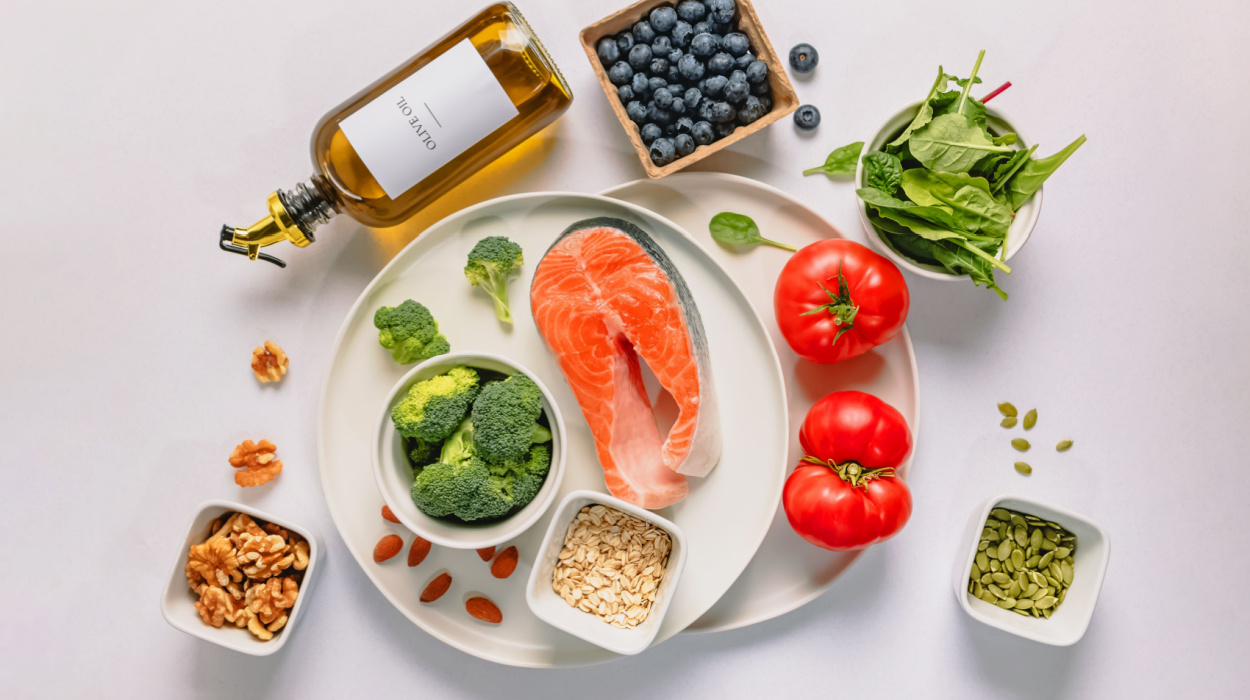 Expert's opinion
Expert's opinion
Expert's opinion
The article is a subjective view on this topic written by writers specializing in medical writing.
It may reflect on a personal journey surrounding struggles with an illness or medical condition, involve product comparisons, diet considerations, or other health-related opinions.
Although the view is entirely that of the writer, it is based on academic experiences and scientific research they have conducted; it is fact-checked by a team of degreed medical experts, and validated by sources attached to the article.
The numbers in parenthesis (1,2,3) will take you to clickable links to related scientific papers.
Anti-Inflammatory Diet: Benefits, What To Eat & Anti-Inflammatory Diet Plan For 2024

Inflammation is a natural immune response of our body to protect itself from infection. Chronic inflammation, on the other hand, is associated with the development of chronic diseases, even possibly cancer. For some of us, who suffer from diseases that cause inflammation, it might be hard to find relief.
Lifestyle changes in conjunction with any needed medical treatment may ease your symptoms. Foods can be used to ease inflammation. The anti-inflammatory diet may benefit those who suffer from chronic diseases or are looking to prevent them. So how can we put into practice the anti-inflammatory diet and reap its benefits?
Anti-Inflammatory Diet For Beginners: A Sample Wellness Meal Plan
Sample Meal Plan For An Anti-Inflammatory Diet
There are many alternatives when planning a menu; make sure to include foods with anti-inflammatory power. Look for anti-inflammatory diet recipes and cookbooks for more ideas. You can also adjust your favorite recipes to contain more antioxidant-rich foods.
If you are a beginner or have never adjusted your diet before, it is best to take small steps. Include foods that you are familiar with first. Then slowly exchange items in your pantry. Finally, be adventurous and try new foods and recipes; you might find some unexpected new favorites.
Some meal ideas to take home:
Breakfast: Nutrient-Packed Oatmeal Delight (Approx. 267 Calories)
Start your day with a wholesome and anti-inflammatory breakfast that’s not only delicious but also packed with essential nutrients to support your well-being. Nutrient-Packed Oatmeal Delight combines the goodness of whole grains, antioxidants, and healthy fats. Enjoy this satisfying and nutritious breakfast to start your day with a healthy dose of anti-inflammatory ingredients, setting the tone for a day filled with vitality and wellness.
| Breakfast | |
| Oatmeal | Half a cup |
| Blueberries | A quarter cup |
| Walnuts | One tablespoon |
| Low-fat milk or dairy alternatives | Half a cup |
| Coffee or tea | Varies |
Lunch: Vibrant Anti-Inflammatory Lunch (Approx. 404 Calories)
Vibrant Anti-Inflammatory Lunch is a delightful and nourishing choice for those seeking to reduce inflammation and boost overall health. This colorful and flavorful lunch combines a variety of wholesome ingredients that not only taste great but also support your body’s anti-inflammatory processes. With a balance of nutrients and a variety of delicious ingredients, it’s a satisfying and health-conscious choice for your midday meal.
| Lunch | |
| Lentil soup | One cup |
| Carrots | Half a cup |
| Brown rice | Half a cup |
| Mixed fresh fruit salad | One cup |
| Water | Varies |
Dinner: Herbal Salmon Delight (Approx. 311 Calories)
Indulge in our Herbal Salmon Delight, a delightful dinner option designed to harness the power of anti-inflammatory foods while tantalizing your taste buds. This meal artfully combines fresh ingredients to provide a satisfying and nourishing dining experience. The Herbal Salmon Delight is a delightful and nutritionally balanced dinner that supports your anti-inflammatory diet goals.
| Dinner | |
| Baked salmon | Four ounces |
| Herbs (use your preferred herbs) | Based on personal taste |
| Mixed greens | Two cups |
| Cooked quinoa | Half a cup |
| Green tea | Varies |
Snack: Crunchy Carrot Delight (Approx. 150-180 Calories)
The Crunchy Carrot Delight is a wholesome and delicious way to satisfy your mid-day cravings while promoting overall well-being, it’s combines the vibrant orange goodness of baby carrots with the creamy indulgence of hummus, creating a dynamic duo that’s not only satisfying to your taste buds but also supportive of an anti-inflammatory lifestyle.
| Snack | |
| Baby carrots | One cup |
| Hummus | A quarter cup |
When planning your meals, you can follow the recommendations from My Plate.[1] Try to include a fruit and vegetable on your plate for every main meal.
What Is An Anti-Inflammatory Diet?
This diet is mainly composed of foods that may help decrease inflammation. It includes foods high in omega-3 fatty acids, antioxidants, and fiber. It also recommends avoidance of foods high in saturated fats, those overly processed, and excess sugar.
Chronic low-grade inflammation can last months, even years. Infection, an autoimmune disorder, and oxidative stress can all cause it. There are also risk factors like age, obesity, stress, and lack of sleep that may be a cause of low-grade inflammation. Specific foods may also worsen the body’s response to inflammation. While other foods may help with anti-inflammatory effects and even protect the body from it.
The anti-inflammatory diet itself is meant to aid a decrease in ameliorating this response. Some other diet patterns that can assist with inflammation are the Mediterranean and the DASH diets. Both of these are also known to help people manage hypertension and prevent heart disease. Plant-based diets, like vegan and vegetarian diets, can also be another anti-inflammatory diet, so there is more than one diet option to help you reduce inflammation.
Including more fruits and vegetables will increase the consumption of antioxidants.[2] These nutrients will capture free radicals that cause oxidative damage in the body. Foods like berries, kale, beans, beets, citrus fruit, tomatoes, and spinach contain various antioxidants. Other foods like dark chocolate and nuts also contain antioxidants.
Eating a varied diet will make sure you consume many vitamins, minerals, and other components that act as antioxidants. These can prevent inflammation or even help ease it. Different antioxidants affect separate body parts like the eyes, skin, arteries, and the immune system.
Balancing the consumption of polyunsaturated fats, omega-3 fatty acids, and omega-6 fatty acids will provide you with essential fatty acids and result in better anti-inflammatory responses. Fatty fish, flaxseed, and walnuts are sources of these fatty acids.
Eating more omega-3-rich foods in exchange for red meats and whole-fat dairy may help modulate the inflammatory process and also work as an antioxidant.
Decreasing the consumption of foods that can cause inflammation or avoiding[3] a Western diet, also called the standard American diet, or SAD is also important. Avoidance of red meats, overly processed foods,[4] high-fat dairy, excess sugar, and alcohol can also help prevent inflammation. Eating these foods in large amounts is associated with the development of diabetes, heart disease, cancer, and other chronic diseases.
While diet is an important component for managing inflammation, a holistic approach is most beneficial. Managing your stress, getting at least 7 hours of sleep,[5] working out, and managing your weight are also needed to achieve full benefits.
Benefits Of An Anti-Inflammatory Diet
Diets with anti-inflammatory attributes have been studied in the hopes they can help with many diseases. There are many benefits to following an anti-inflammatory diet plan, such as:
Decrease In Pain
In a study, people[6] who suffered from rheumatoid arthritis who followed a form of the anti-inflammatory Mediterranean diet reported significantly less pain than those people who followed a conventional diet. This study concluded that diet has the potential to help manage pain from diseases.
Protection Against Diseases
Improving food choices may lead to the prevention of chronic diseases. Following the Mediterranean diet may help[7] improve insulin sensitivity in conditions like diabetes, polycystic ovary syndrome, and nonalcoholic fatty liver disease. Diets like the Mediterranean diet[8] may also protect from cardiovascular diseases due to their antioxidant content from polyphenols and omega-3. Its fruits, wine, fatty acids, and extra virgin olive oil are associated with this benefit.
This diet has components that support our immune system and protect us from oxidative stress. A diet high in saturated fats, high in calories, and low consumption of fruits and vegetables can all affect our ability to fight diseases.
Healthy Gut
Eating more anti-inflammatory foods will provide additional fiber and antioxidants. This increase can assist with healthy bowel movements, along with keeping your gut bacteria happy. Having the right bacteria[9] in our intestines can reduce inflammation. It can also improve digestion, satiety, and nutrient absorption. Following a Mediterranean diet may help with this.
Manage Hypertension
Diets that fight inflammation can also help treat high blood pressure. The Dietary Approach to Stop Hypertension Diet[10] (DASH) effectively manages hypertension. It also contains many components that fight inflammation and serve as antioxidants, like nuts, fatty fish, fruits, and vegetables.
May Help With Weight Loss
Following a calorie-restricted form of an anti-inflammatory diet, along with physical activity as able, can help promote weight loss. A study[11] where participants followed a restricted-energy anti-inflammatory diet showed a reduction in body mass index or BMI, concluding that the anti-inflammatory diet may be an effective treatment modality in obesity management and weight loss.
Anti-Inflammatory Foods To Eat And Inflammatory Foods To Avoid

Although there are some plans with different approaches, some specific foods showed evidence of their anti-inflammatory activity. Choosing an anti-inflammatory meal plan may provide you with health benefits.
Carbohydrates
Foods To Eat
- Oats
- Quinoa
- Brown rice
- Wild rice
- Barley
Foods To Avoid
- Enriched flour products
- Sugar
- Syrups
- Whole milk
- Sweetened nuts
- Seed beverages
Protein
Foods To Eat
- Fish (salmon, sardines, tuna, trout, mackerel)
- Wild game
- Bison
- Beans
- Peas
- Lentils
- Nuts
- Seeds
- Soybeans
- Tofu
- Tempeh
- Eggs
Foods To Avoid
- Pork
- Beef
- Lamb
- Processed meats
- Cheese
- Whole fat yogurt
- Poultry with skin
Vegetables
Foods To Eat
Non-starchy options like
- Tomatoes
- Dark leafy greens
- Mushrooms
- Broccoli
- Cauliflower
- Brussel sprouts
Foods To Avoid
- Starchy vegetables
Fruits
Foods To Eat
- Fresh or frozen like
- Berries
- Apples
- Citrus
Foods To Avoid
- Juice drinks sweetened with sugar
- High fructose corn syrup
- Beverages with a high glycemic index
Fats
Foods To Eat
- Flaxseed
- Chia
- Hemp seed
- Walnut
- Almond (also proteins)
- Oils like Cold-pressed extra virgin olive oil, canola, almond, and flaxseed
Foods To Avoid
- Cream
- Butter
- Margarine
- Fried foods
- Buttery crackers, or cookies
- Oils like corn, vegetable, cottonseed, sunflower, and palm
Others
Foods To Eat
- Water
- Tea
- Coffee
- One 5-ounce glass of wine
- Spices and herbs
- Onions
- Ginger
- Garlic
- Smoothies as opposed to high-sugar juices
- Foods with a high glycemic index
Foods To Avoid
- Sweetened beverages
- Excess alcohol
- Sodas
- Energy drinks
- Sugar
- High-fructose corn syrup[12]
- Artificial sweeteners[13]
These other foods are considered neutral and can be included in the diet: whole grains, whole wheat bread, brown pasta, or whole grain cereal, skinless chicken and turkey, olives, avocado, nuts, seeds, sesame oil, peanut oil, and avocado oil.
Who Should Try An Anti-Inflammatory Diet?

An anti-inflammatory diet sounds like it targets a specific population, but it can be followed by anyone. Access to most of these foods may be limited in specific areas of the world or due to financial constraints. In essence, reducing the consumption of added sugar, fatty meats, and overly processed foods can be a start.
People who suffer from some of these conditions might benefit from following an anti-inflammatory diet:
- Obesity. This is considered to be a pro-inflammatory disease.
- Rheumatoid arthritis. A painful chronic inflammatory disease that affects the joints of the body and affects the quality of life of individuals who suffer from it.
- Diabetes mellitus. It can be linked to chronic inflammation. Following a lower carbohydrate diet may help you improve blood glucose.
- Cardiovascular disease or at risk of it. Oxidative stress and chronic inflammation can cause damage to our arteries.
- People with bowel conditions. The anti-inflammatory diet may be mainly indicated for people without active bowel inflammation and, if not required to follow a diet low in Fermentable Oligosaccharides, Disaccharides, Monosaccharides, and Polyols, also called the FODMAP diet. People with gastritis or irritable bowel syndrome (IBS) may also benefit from an anti-inflammatory diet.
You can work with a Registered Dietitian if you would like to include foods that decrease inflammation in your diet. They can help ensure you are eating a balanced diet and adjust if needed for medical conditions.
The Takeaway
Following a diet that includes foods with anti-inflammatory potential may help improve health. It can be specifically good to follow this diet if you suffer from conditions that cause chronic inflammation, suffer from chronic pain, or are interested in preventing diseases. This might be a good plan for you.
Anti-inflammatory diets can be particularly beneficial when avoiding excess consumption of foods high in saturated fats, overly processed foods, and sugary beverages. Anti-inflammatory benefits can be amplified by adjusting your lifestyle to include physical activity, practicing good stress management techniques, and getting sufficient restorative sleep.
+ 13 sources
Health Canal avoids using tertiary references. We have strict sourcing guidelines and rely on peer-reviewed studies, academic researches from medical associations and institutions. To ensure the accuracy of articles in Health Canal, you can read more about the editorial process here
- Myplate.gov. (2020). USDA MyPlate What Is MyPlate? [online] Available at: https://www.myplate.gov/eat-healthy/what-is-myplate.
- NCCIH. (2017). Antioxidant Supplements: What You Need To Know. [online] Available at: https://www.nccih.nih.gov/health/antioxidant-supplements-what-you-need-to-know.
- Ida Judyta Malesza, Michał Malesza, Walkowiak, J., Nadiar Mussin, Walkowiak, D., Aringazina, R., Bartkowiak‐Wieczorek, J. and Edyta Mądry (2021). High-Fat, Western-Style Diet, Systemic Inflammation, and Gut Microbiota: A Narrative Review. Cells, [online] 10(11), pp.3164–3164. doi:https://doi.org/10.3390/cells10113164.
- Martínez, E.E., Abigail Meza Peñafiel, Escalante, H. and Cabrera, Z.M. (2021). Ultra-processed diet, systemic oxidative stress, and breach of immunologic tolerance. Nutrition, [online] 91-92, pp.111419–111419. doi:https://doi.org/10.1016/j.nut.2021.111419.
- CDC (2022). How Much Sleep Do I Need? [online] Centers for Disease Control and Prevention. Available at: https://www.cdc.gov/sleep/about_sleep/how_much_sleep.html
- Schönenberger, K.A., Anne-Catherine Schüpfer, Viktoria Gloy, Harmatz, P., Stanga, Z., Kaegi-Braun, N. and Reber, E. (2021). Effect of Anti-Inflammatory Diets on Pain in Rheumatoid Arthritis: A Systematic Review and Meta-Analysis. Nutrients, [online] 13(12), pp.4221–4221. doi:https://doi.org/10.3390/nu13124221.
- Mirabelli, M., Chiefari, E., Arcidiacono, B., Corigliano, D., Brunetti, F., Maggisano, V., Russo, D., Foti, D. and Brunetti, A. (2020). Mediterranean Diet Nutrients to Turn the Tide against Insulin Resistance and Related Diseases. Nutrients, [online] 12(4), pp.1066–1066. doi:https://doi.org/10.3390/nu12041066.
- Billingsley, H. and Carbone, S. (2018). The antioxidant potential of the Mediterranean diet in patients at high cardiovascular risk: an in-depth review of the PREDIMED. Nutrition & Diabetes, [online] 8(1). doi:https://doi.org/10.1038/s41387-018-0025-1.
- Bagheri, S., Samaneh Zolghadri and Stanek, A. (2022). Beneficial Effects of Anti-Inflammatory Diet in Modulating Gut Microbiota and Controlling Obesity. Nutrients, [online] 14(19), pp.3985–3985. doi:https://doi.org/10.3390/nu14193985.
- Filippou, C., Costas Tsioufis, Thomopoulos, C., Costas Mihas, Dimitriadis, K., Sotiropoulou, L., Chrysochoou, C., Petros Nihoyannopoulos and Dimitrios Tousoulis (2020). Dietary Approaches to Stop Hypertension (DASH) Diet and Blood Pressure Reduction in Adults with and without Hypertension: A Systematic Review and Meta-Analysis of Randomized Controlled Trials. Advances in Nutrition, [online] 11(5), pp.1150–1160. doi:https://doi.org/10.1093/advances/nmaa041.
- Gordana Kenđel Jovanović, Mrakovčić-Šutić, I., Sandra Pavičić Žeželj, Branislav Šuša, Rahelić, D. and Sanja Klobučar Majanović (2020). The Efficacy of an Energy-Restricted Anti-Inflammatory Diet for the Management of Obesity in Younger Adults. Nutrients, [online] 12(11), pp.3583–3583. doi:https://doi.org/10.3390/nu12113583.
- DiNicolantonio, J.J., Team, E., Neema Onkaramurthy and O’Keefe, J.H. (2018). Fructose-induced inflammation and increased cortisol: A new mechanism for how sugar induces visceral adiposity. Progress in Cardiovascular Diseases, [online] 61(1), pp.3–9. doi:https://doi.org/10.1016/j.pcad.2017.12.001.
- Basson, A.R., Rodriguez-Palacios, A. and Fabio Cominelli (2021). Artificial Sweeteners: History and New Concepts on Inflammation. Frontiers in Nutrition, [online] 8. doi:https://doi.org/10.3389/fnut.2021.746247.



